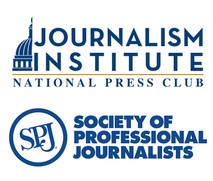
America’s public schools are coming under unusually strong attention from the general public — scrutiny communities typically rely on journalists to provide. The issues are as disparate as masking mandates and COVID-19 testing, the spending of federal pandemic relief funds, virtual vs. in-person learning, gun threats and increasing demands by lawmakers and parents that schoolchildren not be taught certain subjects such as human sexuality and the history of racism.
But journalists face multiple barriers, many imposed by governments or school districts, in covering these complex topics.
How to overcome them? An expert panel will provide answers at a virtual program produced by the national Society of Professional Journalists Freedom of Information Committee* and the National Press Club Journalism Institute in coordination with the Club’s Press Freedom Team on Wednesday, March 16, at 12:30 p.m.
The program occurs during Sunshine Week, an annual celebration of access to public information and what it means for communities.
The panel will explore the impact of the barriers to press coverage of public schools and how to work around them. Among the barriers are practices such filtering all interviews through public information officers and prohibiting teachers, school staff and other key education officials from sharing their stories.
Adding to the difficulty in coverage are policies that limit access to key education-related data sets, which makes answering the public’s questions in a timely, thoughtful and detailed manner exceedingly difficult.
Panelists include:
- Eva-Marie Ayala, Education Lab editor for The Dallas Morning News
- Frank LoMonte, journalism professor and counsel at CNN
- Randi Weingarten, president of the American Federation of Teachers, AFL-CIO
- Moderator: Delece Smith-Barrow, education editor at POLITICO.
Eva-Marie Ayala is the Education Lab editor for The Dallas Morning News, where she oversees coverage of how state and local policies impact students, what schools are doing to address inequities in classrooms, and how educators are addressing the great needs brought on by the pandemic. She is a veteran journalist who previously reported for her hometown paper the Fort Worth Star-Telegram. As a member of the Dallas area chapter of the National Association of Hispanic Journalists, she served as a vice president and scholarship chair, working to boost diversity in newsrooms and coverage.
Frank LoMonte is a professor at the University of Florida and counsel at CNN. From 2017 until February this year, he had been the director of the Joseph L. Brechner Center for Freedom of Information at the University of Florida, an incubator for ideas and initiatives that give the public timely and affordable access to the information necessary for informed, participatory citizenship. Previously, he was the executive director of the Student Press Law Center (SPLC) in Washington, D.C. since 2008. During his tenure, he launched a number of major programming initiatives, including the “New Voices” initiative that has resulted in enactment of fortified legal protections for student journalists in 13 states, and the “Active Voice” fellowship program for college undergraduates to design “press freedom service projects” amplifying the voices of young women, who experience the brunt of school censorship. Prior to embarking on his legal career, he was an investigative journalist and political columnist.
Randi Weingarten is president of the 1.7 million-member American Federation of Teachers, AFL-CIO, which represents teachers; paraprofessionals and school-related personnel; higher education faculty and staff; nurses and other healthcare professionals; local, state and federal government employees; and early childhood educators. Prior to her election as AFT president in 2008, Weingarten served for 12 years as president of the United Federation of Teachers, AFT Local 2, representing approximately 200,000 educators in the New York City public school system, as well as home child-care providers and other workers in health, law and education.
Delece Smith-Barrow is the education editor at POLITICO. She’s previously worked at The Hechinger Report, U.S. News & World Report and The Washington Post. She spent the 2016-2017 school year as a Knight-Wallace Fellow at the University of Michigan, where she studied how top-tier universities were increasing the number of underrepresented minority faculty.
* SPJ DC Pro Chapter member Kathryn Foxhall (recording secretary on the SPJ-DC board of directors) is vice chair of the national SPJ Freedom of Information Committee and a member of the NPC Press Freedom Team.
If you have questions about this program, please email Beth Francesco, NPC Journalism Institute senior director, at bfrancesco@press.org.
